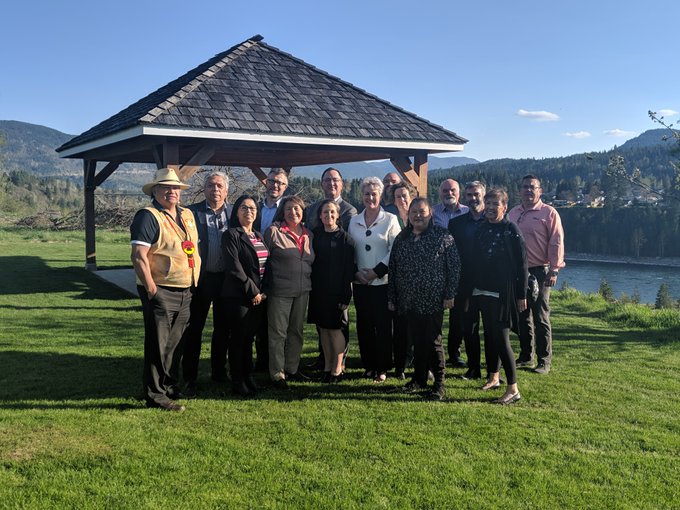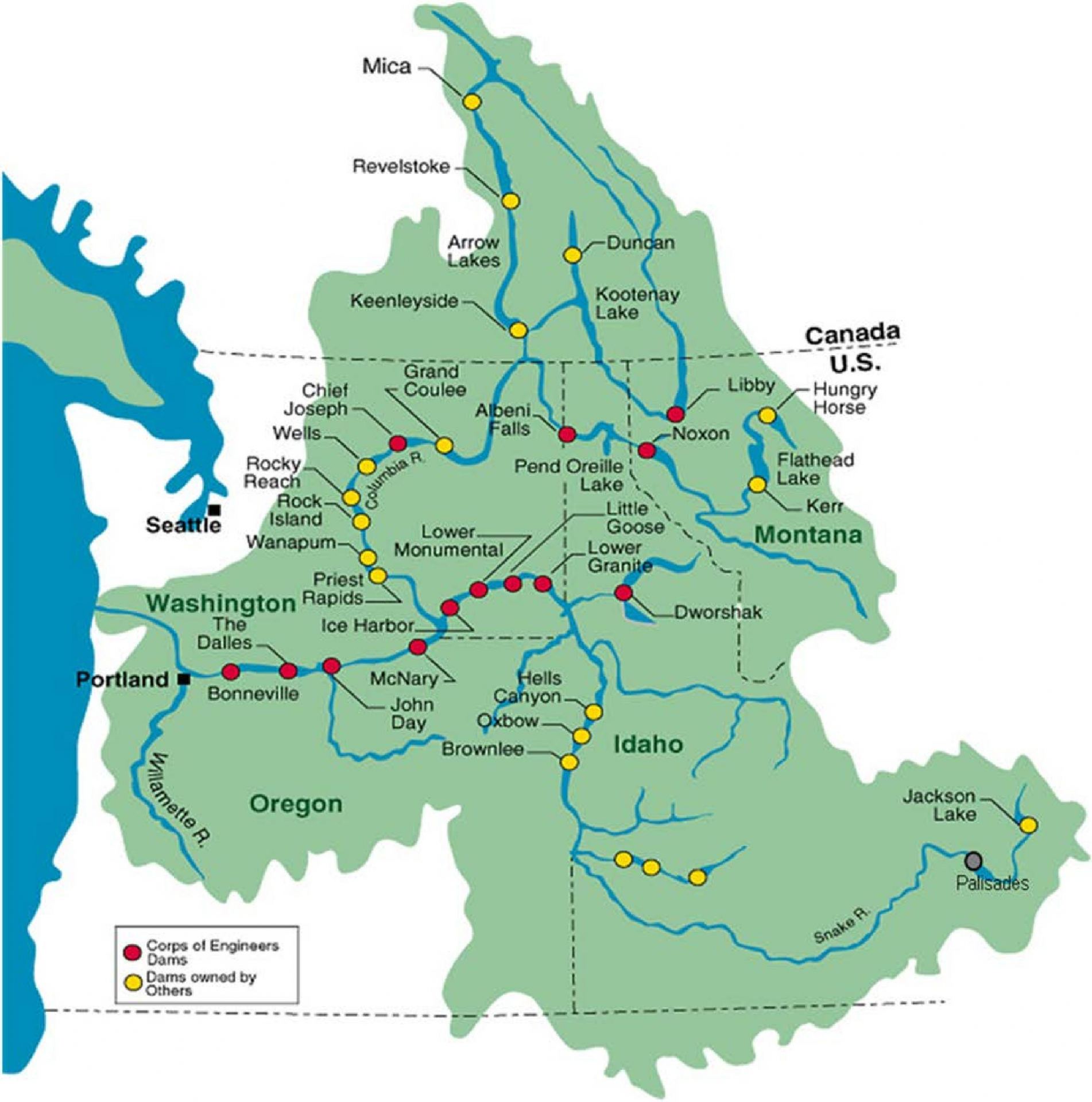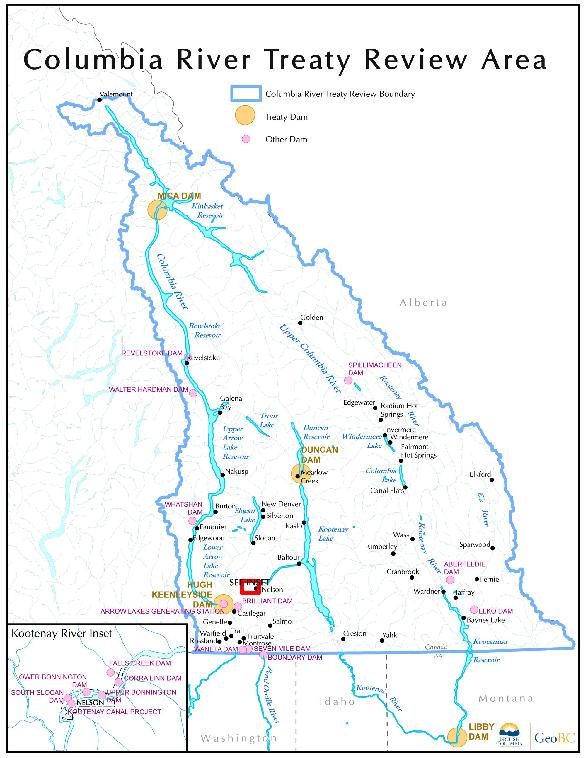Columbia River Treaty (CRT)
The original CRT negotiations between Canada and the United States and the implementation
of the 1964 CRT by British Columbia excluded First Nations and basin residents from providing input into
decisions that had a major impact on their lives and life in the Columbia Basin. When the re-
negotiations (or modernization) of the CRT was first announced, the Secwépemc, Syilx Okanagan and
Ktunaxa Nation Chiefs sent a clear message to the federal and provincial government that the
participation of the Indigenous Nations was required.
Under the CRT, Canada was required to build and operate three dams in the higher elevation reaches of the Basin.
- 1987 Duncan Dam (Revelstoke)
- 1968 Hugh Keenlyside Dam (Arrow Lakes Reservoirs)
- 1973 Mica Dam (Kinbasket Reservoir)
- 1973 A fourth dam (Libby) was constructed in Montana (operated by US entities).
The original 1964 process in which decisions were made to enact the CRT by the provincial and federal governments, excluded First Nations and basin residents from providing input into a decision that had a major impact on their lives and life in the Columbia Basin.
“As a representative of the Secwépemc Nation, I am pleased that the federal government has taken steps to recognize the rights of our people in the negotiation of the Columbia River Treaty through the inclusion of Indigenous Nations Observers within the negotiations. This moves us further down the path of reconciliation.”
– Kukpi7 Wayne Christian, Tribal Chief, Shuswap Nation Tribal Council
The Columbia River has shared importance to each of the Secwépemc, Syilx Okanagan and
Ktunaxa Nations Indigenous Nations). The CRT caused a wide range of adverse impacts to Indigenous
economies, harvesting activities, cultures, spiritual practices and communities that remain ongoing
today. The building of dams, flooding of the lands, and the creation of reservoirs and operation of the
CRT system has resulted in great infringement on Secwépemc rights and title.
Equally important, from a governance perspective was to ensure effective participation of
Indigenous Nations through Observer status in the negotiations of the modernized CRT with the US and
to have Canada and British Columbia seek to obtain the Indigenous Nations’ Free Prior and Informed
Consent (FPIC). With that focus in mind, the Indigenous Nations entered into a joint Negotiation
Framework Agreement to guide our engagement with Canada and BC.
“The original Columbia River Treaty in 1964 excluded our Nations, and wreaked decades of havoc on our communities and the basin. Canada’s unprecedented decision to include us directly in the US -Canada CRT negotiations is courageous but overdue and necessary to overcome the decades of denial and disregard. We welcome the government’s bold decision here and look forward to helping to ensure any new Treaty addresses the mistakes of the past.”
– Grand Chief Stewart Phillip, Chair, Okanagan Nation Alliance
On April 26, 2019 the Federal Government announced the Columbia River Basin Indigenous Nations will participate as Observers in the Columbia River Treaty negotiations. The Secwépemc, Ktunaxa and Syilx Okanagan are united and working together on Indigenous Nations priorities for the renegotiation of the CRT.
The purposes of the Negotiations Framework (NFA) Agreement are:
- Establish the principles, processes and commitments that will govern engagement between the Parties on the CRT Negotiations.
- Advance reconciliation and establish the means whereby Canada and B.C will seek to obtain the free, prior and informed consent of the Indigenous Nations regarding the CRT Negotiations; and
- Enable the Parties, whether collectively or through separate bilateral processes, to develop additional agreements related to the CRT including, but not limited to, past and ongoing impacts of the CRT to the Indigenous Nations and the domestic implementation of any outcomes of the CRT Negotiations
- The NFA also sets out the three Indigenous Nations will be observers to the negotiations between Canada and the United States which is a valuable precedent of participation in accordance with Article 18 of the United Nations Declarations on Rights of Indigenous Peoples.

The importance of Indigenous Nations involvement includes.
- Incorporation of ecosystem function based on Indigenous cultural values into a modernized CRT.
- Benefit Sharing of future benefits from the CRT, including a discussion of interim benefits from the current Treaty.
- Initiating negotiations for redress for historic infringement
- A new governance regime for the Upper Columbia Basin
- Salmon Re-Introduction
“I am delighted that, for the first time, Indigenous Nations will officially join our negotiations with the United States about the future of the Columbia River Treaty. I want to thank the Indigenous Nations for their valuable participation and for their patience throughout this process. By working together, we will ensure that negotiations directly reflect the priorities of the Ktunaxa, Okanagan, and Secwépemc Nations – the people whose livelihoods depend on the Columbia River and who have resided on its banks for generations. This is an historic day and demonstrates our government’s commitment to work in full partnership with Indigenous Nations.”
– Hon. Chrystia Freeland, P.C., M.P., Minister of Foreign Affairs
Current Update:
Tenth round of negotiations to modernize the CRT was conducted by web-conference on June 29-30, 2020. Canada responded to a framework proposal by the United States and tabled a Canadian proposal which outlined a framework for a modernized CRT developed collaboratively by Canada, B.C. and the Indigenous Nations.
No new international negotiations have been scheduled due to the COVID-19 pandemic and the U.S elections.


